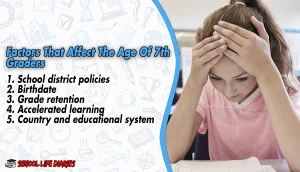In the United States education system, 7th graders are typically around 12 to 13 years old. The exact age may vary depending on the student’s birthdate and when they started school. In other countries, the age range for 7th graders may be different depending on their education system.
Age-Grade Chart
Let’s look at the age requirements for 7th Grade. In the United States, the minimum age for a 7th Grade is typically 12, but this can vary depending on the state and school district. Some states have early entrance or acceleration policies that allow students to start high school at a younger age.
For example, in California, students can enter 7th Grade at the age of 12 if they meet certain academic and maturity requirements. These policies can affect a student’s age in 7th Grade, as some students may be younger or older than their peers.
| Age | Range | Students Called |
| Kindergarten | 5-6 | Kindergartners |
| 1st grade | 6-7 | 1st graders |
| 2nd grade | 7-8 | 2nd graders |
| 3rd grade | 8-9 | 3rd graders |
| 4th grade | 9-10 | 4th graders |
| 5th grade | 10-11 | 5th graders |
| 6th grade | 11-12 | 6th graders |
| 7th grade | 12-13 | 7th graders |
| 8th grade | 13-14 | 8th graders |
| 9th grade | 14-15 | Freshmen |
| 10th grade | 15-16 | Sophomores |
| 11th grade | 16-17 | Juniors |
| 12th grade | 17-18 | Seniors |
What Is 7th Grade Called?
In the United States education system, 7th grade is typically part of middle school or junior high school. The specific name of the school or educational program may vary depending on the region and school district.
In some areas, a middle school includes grades 6-8, while in other areas, the junior high school includes grades 7-9. Some schools or districts may use different naming conventions, such as intermediate school or upper elementary school.
Can 7th Graders Be 11 Or 14?
It is possible for a 7th grader in the United States education system to be 11 or 14 years old, but this depends on the student’s birthdate and when they started school. Typically, 7th graders are around 12 to 13 years old, but there can be some variation in age due to factors such as grade retention or acceleration.
Students who were born in the first part of the year and started school at the earliest possible age maybe 11 years old in 7th grade, while students who were born later in the year or started school later maybe 14 years old in 7th grade.
How Old Should A 7th grader Be?
In the United States education system, a 7th grader should typically be around 12 to 13 years old. However, the exact age may vary depending on the student’s birthdate and when they started school. It is important to keep in mind that age ranges can differ in other countries depending on their education system.
What Age Is Grade 7 In Canada, The UK, And The USA?
Canada, Grade 7 is typically for students who are around 12 to 13 years old. In the United Kingdom (UK), Grade 7 is not a standard educational term. The English education system, which is used in England, Grade 7 would refer to the seventh year of compulsory education, which is equivalent to Year 8
In Year 8, students are usually around 12 to 13 years old. United States, Grade 7 is typically for students who are around 12 to 13 years old as well. However, the exact age may vary depending on the student’s birthdate and when they started school.
Is There A Minimum Age For 7th Grade?
In the United States education system, there is no strict minimum age for 7th grade, but students are generally around 12 to 13 years old. The exact age may vary depending on the student’s birthdate and when they started school. Some students may have started school earlier or later than the typical age, and some students may have been held back or accelerated a grade.
The minimum age for starting kindergarten and the age cutoff for enrollment in different grades are set by each state and can vary. Some states require that students be a certain age by a specific date to enroll in a particular grade.
Is It Better To Start School At An Earlier Age?
There is no definitive answer to whether it is better to start school at an earlier age, as each child’s needs and circumstances are unique. Starting school earlier can have some advantages, such as the opportunity to develop social skills and academic abilities at an earlier age. It can also provide a longer period of time for children to explore different interests and develop their passions.
Starting school earlier can also have some disadvantages. Younger children may struggle to adjust to the structured environment of the school and may find it more difficult to keep up with the academic demands of their grade level. Research suggests that starting school at an earlier age may lead to higher levels of stress and anxiety in some children.
The decision to start school at an earlier age should be based on the individual needs and development of the child, as well as their family’s circumstances and values. It is important to consult with educators, medical professionals, and other experts in order to make an informed decision that is best for the child.
What Time Does A Seventh-Grade Student Start School?
The start time for seventh-grade students can vary depending on the school district and the specific school they attend. In the United States, some middle schools and junior high schools start as early as 7:30 or 8:00 a.m., while others start later in the morning.
Some schools may have staggered start times for different grades, and some may have a flexible schedule that allows students to start at different times depending on their individual needs. It is important to check with the student’s school or school district to find out the exact start time for seventh-grade students.
Some schools may offer before-school programs or extracurricular activities that allow students to arrive early or stay late, so it may be helpful to inquire about these options as well.
Can 7th Grade Students Participate In Sports Competitions?
In the United States, 7th Grade students are typically eligible to participate in middle school sports competitions, depending on the rules and regulations of their school district and state athletic association.
Many middle schools offer a variety of sports programs, such as basketball, soccer, volleyball, track and field, and others, and students can try out for these teams and compete against other schools in their district or region. The eligibility of 7th Grade students to participate in sports competitions may be subject to certain requirements, such as academic standing and physical fitness.
Some schools may require students to maintain a certain grade point average in order to be eligible to participate in sports, and others may require students to undergo a physical examination to ensure that they are healthy and able to participate safely.
Is 7th grade Competitively Harder Than 6th Grade?
In the United States education system, 7th grade is generally considered to be more academically and socially challenging than 6th grade, as students are expected to take on more complex coursework and assignments, and navigate a more complex social environment.
Academically, 7th grade often involves more advanced coursework, such as pre-algebra or algebra, which can be challenging for many students. There may be increased expectations for independent learning and critical thinking, as well as an emphasis on writing and research skills.
Socially, 7th grade can also be more challenging as students navigate increased academic demands and social pressures. Many students in 7th grade are also experiencing physical and emotional changes, which can make the social environment more complex and challenging.
It’s important to note that every student’s experience is unique, and the degree of difficulty in 7th grade may depend on individual factors, such as academic strengths and interests, social skills, and support systems.
Some students may find that they thrive in the more challenging environment of 7th grade, and are able to grow and develop their skills and abilities in this setting.
What Skills Should A 7th Grade Student Have?
Seventh grade is a critical year in a student’s education, as it marks a transition from elementary school to middle school or junior high school. At this level, students are expected to have developed a range of academic and social skills that will help them succeed in middle and high school and beyond. Here are some of the key skills that a 7th Grade student should have or be developing:
1. Reading comprehension:
Students should be able to read and comprehend complex texts, analyze and interpret information, and draw conclusions based on evidence.
2. Writing:
Students should be able to write coherently, using proper grammar, punctuation, and sentence structure. They should also be able to organize their writing into paragraphs, essays, and other formats.
3. Math skills:
Students should have a solid foundation in arithmetic, including fractions, decimals, and percentages. They should also be able to solve equations and work with algebraic concepts.
4. Critical thinking:
Students should be able to analyze and evaluate information, make connections between different ideas, and apply their knowledge to solve problems.
5. Collaboration:
Students should be able to work effectively in groups, communicate their ideas, and listen to and respect the ideas of others.
6. Self-management:
Students should be able to manage their time effectively, set priorities, and complete assignments and projects on time.
7. Technology skills:
Students should be comfortable using technology to research, write, and create content. They should also understand the basics of online safety and digital citizenship.
These skills are not exhaustive and may vary depending on the specific school or district. Developing these key skills can help students succeed in 7th grade and beyond.
What Subjects Do Seventh Graders Learn (U.S. Vs. U.K. Vs. China)
The subjects that seventh graders learn can vary based on the country and education system they are in. Here is a general overview of the subjects that seventh graders in the United States, United Kingdom, and China may study:
1. United States:
In the United States, seventh-grade students typically take a variety of core subjects, including:
- English language arts (reading, writing, and literature)
- Mathematics (algebra, geometry, and basic math skills)
- Science (earth science, life science, and physical science)
- Social Studies (world history, U.S. history, and civics)
- Foreign languages (such as Spanish, French, or German)
- Physical education and health
- Elective courses (such as art, music, or computer science)
2. United Kingdom:
In the United Kingdom, seventh-grade students are typically in Year 8 and study a range of subjects, including:
- English (reading, writing, and literature)
- Mathematics (number, algebra, geometry, and statistics)
- Science (biology, chemistry, and physics)
- History
- Geography
- Religious education
- Physical education and health
- Languages (such as French, German, or Spanish)
- Creative arts (such as art, drama, or music)
3. China:
In China, seventh-grade students typically take a range of core subjects, including:
- Chinese language and literature
- Mathematics (including algebra and geometry)
- Science (including biology, chemistry, and physics)
- History and social studies
- Physical education and health
- English language education
It is important to note that the specific subjects and content covered in each country can vary widely based on regional differences and the particular school or education system.
Related Article: How Old Are You In 9th Grade? Understanding The Age Groups
Common Challenges Faced By 7th Graders At School And In Life
Seventh grade can be a challenging time for many students as they navigate academic, social, and emotional changes. Some common challenges faced by 7th graders include:
1. Increased academic rigor:
Many students find the transition to middle school or junior high school to be challenging, as they are expected to handle more complex academic material and manage a larger workload.
2. Developing independence:
As students move into middle school, they are expected to become more independent and responsible for managing their own schedules, assignments, and deadlines.
3. Social pressures:
Students may feel increased pressure to fit in with peers, which can lead to anxiety, self-doubt, and conflict with others.
4. Changing relationships:
As students enter adolescence, their relationships with friends and family members may change, which can be emotionally challenging.
5. Time management:
With more classes, assignments, and extracurricular activities, many 7th graders struggle with time management and finding a balance between academic, social, and personal obligations.
6. Bullying and harassment:
Unfortunately, some students may experience bullying, harassment, or discrimination from peers, which can have negative effects on their academic and social well-being.
7. Self-esteem and body image:
As students develop physically and emotionally, they may struggle with self-esteem and body image issues, particularly if they feel pressure to conform to societal expectations or peer norms.
These challenges are not exhaustive and may vary depending on the individual student and the school environment. Developing coping skills and support systems can help students navigate these challenges and succeed in 7th grade and beyond.
Ways To Prepare Your Child For 7th Grade:
Preparing your child for 7th grade can help them feel more confident and successful as they navigate the challenges of middle school. Here are some ways you can help your child prepare for 7th grade:
1. Encourage independence:
Middle school is a time when children are expected to become more independent and responsible for their own learning. Encourage your child to take ownership of their academic and personal responsibilities and help them develop time-management and organizational skills.
2. Set academic goals:
Work with your child to set academic goals for the school year, such as improving grades in a particular subject or participating in a school club or sport. Encourage them to take on challenging coursework and develop a growth mindset that emphasizes effort and persistence over natural ability.
3. Discuss social and emotional issues:
Middle school is also a time when children are navigating changes in their social and emotional lives. Talk with your child about the challenges they may face, such as peer pressure or bullying, and help them develop healthy coping strategies and self-esteem.
4. Establish routines:
Set up routines and schedules for homework, studying, and extracurricular activities that support your child’s academic and personal goals. Encourage them to take breaks and engage in physical activity and hobbies that support their mental and emotional well-being.
5. Attend orientation events:
Attend orientation events at your child’s school to help them become familiar with the school environment, meet teachers and classmates, and learn about school policies and procedures.
6. Foster a love of learning:
Help your child develop a love of learning by encouraging them to read, explore new interests, and engage in learning outside of school. Encourage their curiosity and help them connect what they are learning in school to the real world.
By taking these steps, you can help your child feel prepared and confident as they begin 7th grade and set them up for academic and personal success throughout middle school and beyond.
Factors That Affect The Age Of 7th Graders
The age of 7th graders can vary based on a few different factors, including:
1. School district policies:
In the United States, school district policies can vary on when children are eligible to start school, which can affect their age when they reach 7th grade.
2. Birthdate:
Children who have birthdays earlier in the year may be older and more mature than their classmates who have birthdays later in the year. This can affect their academic and social development and can impact their experience in 7th grade.
3. Grade retention:
Some students may be held back or repeat a grade, which can affect their age and grade level when they reach 7th grade.
4. Accelerated learning:
Some students may skip a grade or participate in advanced academic programs, which can result in them being younger than their peers in the same grade.
5. Country and educational system:
The age range for 7th graders can vary depending on the country and educational system. For example, in some countries, students may start school at a younger age and progress more quickly through the grades, resulting in them being younger when they reach 7th grade.
Overall, while age can be a factor in a student’s experience in 7th grade, it is important to remember that students of different ages and backgrounds can excel academically and socially with the right support and resources.
Final Verdict:
In conclusion, knowing the age range of 7th graders can help parents and teachers better understand and support the needs of students at this grade level. While there may be variations in age and development among students, the typical age range for 7th graders is 12 to 13 years old.
It’s important to keep in mind that every student is unique and may develop at their own pace, so it’s important to provide individualized support and guidance. By understanding the age range of 7th graders and the developmental changes they may be experiencing.









